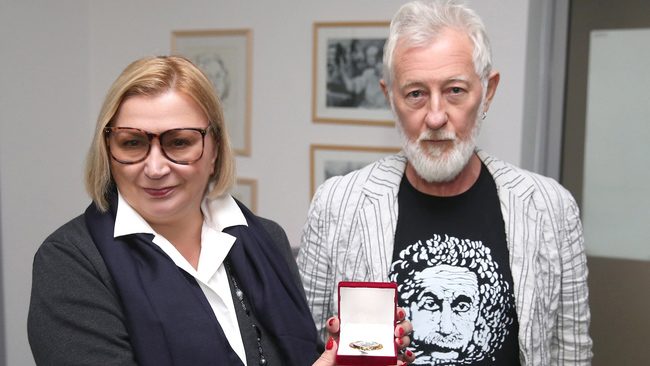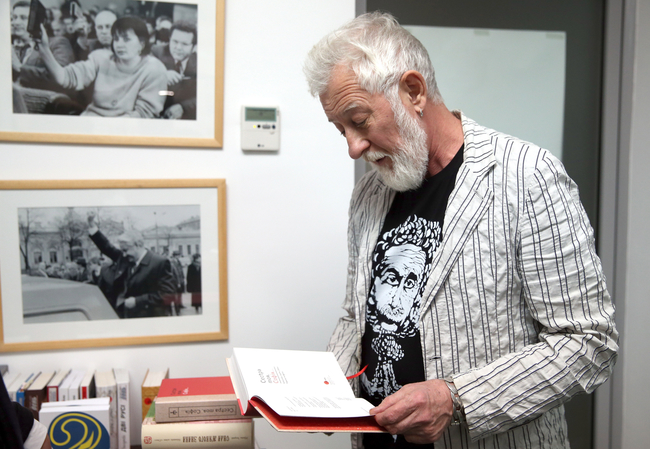Andrei Sakharov and Den. Discussing an award
The Sakharov Prize founder Peter Vins presented the Order “For Courage” to Den’s editor-in-chief Larysa Ivshyna
The news of the Academician Sakharov Prize for Journalism as an Act of Conscience having been awarded to the newspaper Den came as a pleasant surprise for the whole editorial team. According to organizers of the contest and jury members, the award “For Journalism as an Act of Conscience” is bestowed for activities “reflecting the values that Andrei Sakharov defended.” The jury that determined the winners included Lilia Shevtsova (who actually nominated Den for the award), Svetlana Alexievich, Yulia Suntsova, Miyasat Muslimova, Vladimir Voinovich, Valery Borshchev, Yuri Felshtinsky, Vitaly Chelyshev, and Yuri Chernyshev. Garry Kasparov chaired the jury. For 16 years in a row, it had determined the best independent media in Russia alone, while this year, the scope of the event expanded for the first time, to cover Ukraine and Belarus as well.
The founder of the award was Peter Vins, a Soviet dissident, member of the Helsinki Group human rights organization, and ethnic Ukrainian, who was expelled from the USSR in 1979 and deprived of Soviet citizenship, and then rehabilitated during the perestroika. On November 2, he came to the editorial office of Den to personally congratulate our editor-in-chief Larysa Ivshyna. This is also the first year after the organizers developed the Order “For Courage.” It was produced in Kyiv according to Vins’s own design.
“When I returned to Ukraine eight years ago, I immediately began to read Den. I get real spiritual pleasure from it,” Vins said. “It is like love at first sight. We have a large number of interesting information programs and media in Ukraine, but often it seems that all of this is just a circus where opinions and facts are being juggled. Den offers a completely different level and direction. One simply reads and enjoys having one’s inner self enriched. One can find many interesting articles, projects that involve young people there. Our award aims to lend a shoulder and say ‘thank you’ to everyone who is fighting for our freedom.”
Ivshyna called the award a fundamental breakthrough. “Den has always been a platform for free thought and a newspaper for communication at the supranational level,” she said. To prove it, it is enough to recall Gennady Burbulis’s visit to Den’s editorial office, numerous interviews with leading foreign journalists, the book My Sister Sofia... and constant attention to other nations which is reflected in our Library book series and on the pages of the newspaper alike. “How can it be otherwise in the homeland of Vladimir Vernadsky, who originated the concept of the noosphere on the basis of synthesis of matter?” the editor-in-chief emphasized.
At the same time, we would like to emphasize some dubious details of this award. The list of laureates includes 33 positions, including the TV channel Dozhd, whose fake liberalism has repeatedly been exposed by Den, and the Echo of Moscow radio station which conducted a survey lately asking “whom you are more afraid of: Ukrainians or Chechens.” There are only four Ukrainian laureates: in addition to Den, it also includes Radio Svoboda, Krym.Realii, and Ukrainska Pravda. And we wrote about the latter more than once, saying that trying to expose the murderers of the media outlet’s founder journalist Georgy Gongadze should have been a matter of honor for it. However, only Den has been systematically monitoring this topic and calling for punishment of principal criminals for many years. We asked Vins about the reasons for having such dissimilar laureates.

PETER VINS RECEIVED AS GIFTS THIS FALL’S NEW BOOK THE CROWN, OR HERITAGE OF THE RUS’ KINGDOM AND THE “GRANDMOTHER” OF DEN’S LIBRARY SERIES – THE COLLECTION UKRAINE INCOGNITA. “DEN IS A TREAT FOR A REAL GOURMET,” VINS SAID REPEATEDLY / Photo by Artem SLIPACHUK, The Day
“The main criterion for determining nominees and winners is whether journalists tell the truth in their contributions, even if their opinions do not coincide with ours. We look whether the author is ready to suffer for their beliefs. After we awarded the prize to the Echo of Moscow, people started to harshly criticize us, others began to say that Dmitry Muratov [editor-in-chief of Novaya Gazeta, which is also among the awardees. – Ed.] was influenced by the government. But my response is that I present the award not to Muratov or Alexei Venediktov, but to dozens of journalists who work for that publication and write articles that put them in mortal danger. And many of them have paid with their lives or freedom for them. Another misunderstanding was also caused by us awarding the prize to the editorial team of the Russian media vDUD. This was suggested by one of the most respected members of the jury. Yes, it was a strange suggestion, but we reviewed it and decided that they met the ‘philosophy’ of the award. They record very hot, interesting interviews. This is not the interview style that we like, but their audience is young, and their videos get millions of views precisely among these people. We understand that there is a shift happening, and we want the award to keep up with the times. When we founded the award in 2001, the Internet was ‘in its infancy,’ YouTube was not to appear for another eight years, the concept of video blogging was absent, but now this is the reality of our media. Therefore, there are such different media outlets among the laureates.” Also, Vins said that in the near future he will have to create a “rising star” award for young journalists, as well as a special system of grants for the development of editorial teams. “For this, it is important for us to find worthy juries in Ukraine, Belarus, and other countries where the prize will operate,” he said.
“JOURNALISM IS AT THE FOREFRONT OF THE STRUGGLE FOR FREEDOM”
“The first reason for the decision to create the prize was my conviction that journalism is always at the forefront of the struggle for our freedom in any society,” Vins told The Day. “Be it a totalitarian, oligarchic, or democratic one, the press are always the first to go to the barricades and risk their own lives. If you add up the lists of journalists killed in different countries of the post-Soviet space, these are terrible figures: more than a thousand people who were brutally murdered. I will always treat with great respect those who are moving forward and make breakthroughs. The second reason is of personal nature, it is to say ‘thank you’ to Andrei Sakharov. He did a lot in his time, and not only for me and my family, as he helped thousands upon thousands of people. I was directly involved in this process and saw concrete assistance being provided. For example, I transferred money from Sakharov and his fund to Ukrainian dissidents, handed it over to the Svitlychny family who then distributed it to further recipients, and to Raisa Rudenko, the wife of the founder of the Ukrainian Helsinki Group. I and my young friends carried letters to Kyiv from the forced labor camps, and brought back samizdat and material assistance. Sakharov helped everyone, ranging from Ukrainian dissidents to extreme Russian nationalists, although he disagreed with the latter on everything. He considered it his duty to help those who were in danger and need. When I was studying at an American university, I often went to Chicago on weekends and could always stop at Sakharov and his wife Elena Bonner. He always agreed to provide money so that our family could fly to Yakutsk, where my father was serving his sentence in a strict regime camp...”
“SOMEONE IN RUSSIA NEEDED A HALF-DEAD PRIZE…”
For a long time the jury was headed by the president of the Glasnost Defense Foundation Alexei Simonov, but this year he was replaced by the head of the Human Rights Foundation Kasparov.
“Last year, a scandal broke out around the award when I dismissed the entire jury and changed the chairman,” Vins said. “Do you know why I did so? I just asked them a provocative question about Crimea. And they started flinging mud at me. We argued about whether to accept as nominees journalists from Crimea, since even as late as 2016, the prize covered only Russia. And I asked them: so whose land is Crimea? I posed this question to chairman of the jury Alexei Simonov three times, but he stayed silent. After that, I took drastic measures. And they worked well. For the last few years, the number of authors who participated in the competition fell every year. At first it was two hundred or three hundred authors, then it fell to 50, 40, 31 authors. And most importantly, their works started focusing on problems of housing and communal services, disabled people, and poor-quality medicines. These are important topics, but neither important enough for the award nor worthy of Sakharov’s name. I was not in Russia, and the jury tried to convince me: ‘Independent journalism has died, only such works are being submitted.’ Now I understand that someone in Russia needed just such a half-dead, moribund prize, which continued to exist only in name. After clearing the ‘Augean stables,’ new wonderful people came to sit on the jury. Now it includes authoritative figures such as Kasparov, Voinovich, Alexievich.”
COMMENTARIES
“AWARDING THE PRIZE TO DEN IS RECOGNITION OF ITS ROLE IN THE STRUGGLE AGAINST RUSSIAN IMPERIALISM”
Serhii HRABOVSKYI, political writer and analyst, winner of the James Mace Award:
“In Russian culture, politics and journalism, along with the dominant imperial-chauvinistic line, another line has existed, one that has been democratic and anti-imperial. It is personified first and foremost by the names of Alexander Herzen and Andrei Sakharov. And awarding the Sakharov Prize for Journalism as an Act of Conscience to Den, among other media, is recognition of the publication’s role in the struggle against Russian imperialism and for democracy not only in Ukraine itself, but also where the Kremlin and Lubyanka [i.e., the FSB. – Ed.] consider themselves in total control, that is, in the struggle for the hearts and minds of Russian citizens.
“It catches the eye that all the Ukrainian laureates are not purely Russian-language: for instance, Den is published in Ukrainian, has Ukrainian- and Russian-language websites and an English-language twice-weekly digest The Day, while Krym.Realii reaches its audience in the Crimean Tatar, Ukrainian, and Russian versions. However, the linguistic dimension does not create barriers for the perception of anti-imperial ideas and credible information by the democratic public in Russia.”
“IT IS A SIGN OF SUPPORT IN A REGION WHICH ATTRACTS THE ATTENTION OF INTERNATIONAL PUBLIC”
Boris SOKOLOV, a historian, political writer, Den’s contributor:
“The fact that Den was awarded the Sakharov Prize for Journalism as an Act of Conscience is welcome. Den today is one of the few remaining independent publications in the entire post-Soviet space (with the exception of the Baltic States). The newspaper’s editorial team has always defended the rights of the individual if they were violated by government actions, and this activity is in full conformity with the principles which guide the founders of the Sakharov Prize.
“Den also provides a platform for journalists and public figures who are practically deprived of the opportunity to publish their opinions which are critical of the incumbent governments in their countries where freedom of speech is either absent or very limited, and for this we should be grateful to the newspaper. Most importantly, Den faithfully follows the principles of genuinely independent journalism and refuses to support any of the existing parties and financial groups in Ukraine. So, the Sakharov Prize has long been deserved by the newspaper and its awarding is a sign of support for independent journalism in a region which attracts the attention of international public in connection with the ongoing war in the Donbas and the Russian annexation of Crimea.”
Newspaper output №:
№67, (2016)Section
Close up





